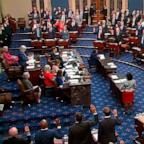Feds Freeze Poker Champ's Winnings
Federal officials order banks to freeze millions in online poker winnings.
June 11, 2009— -- On the Sunday before Memorial Day, David made the big time.
Winning $10,000 in an online poker tournament made him eligible for the upcoming World Series of Poker, the game's premier event, where hundreds of players -- amateur and professional -- descend on Las Vegas from around the world to play for a multimillion-dollar pot.
To register, he simply had to cash a check cut by a company that processed payments for the poker Web site Pokerstars.com and use the $10,000 to buy into the series.
When he went to cash the check from Account Services Wednesday, it bounced, he said.
What David, a 41-year-old from Virginia who spoke on the condition that ABC News use only his first name, initially thought was a glitch turned out to be part of an unprecedented government crackdown on online poker that affected some 27,000 people.
Late last week, the federal government ordered five banks to freeze a total of $30 million in payments owed to the players from companies that process payments from two offshore gambling sites, according to the Poker Players Alliance, a group that represents the interests of the companies and players.
"It's not like the government went after money that the site made, instead they seized money that belonged to me," David said. "There is no law that restricts citizens from recovering money."
According to the alliance, federal prosecutors working out of New York's Southern District ordered Citibank, Wells Fargo and three smaller banks to freeze funds in accounts belonging to Allied Systems and Account Services, companies that process funds for the poker sites.
Some affected players who gamble at the popular sites FullTiltPoker.com and PokerStars.com first realized they could not access funds in their accounts over the weekend when checks issued from the companies bounced.
Online poker, a $9 billion to $12 billion a year industry, is legally a gray area, experts told ABCNews.com. Washington is the only state with a law on its books that bans residents from playing on the Internet. The sites themselves, however, are not allowed to operate in the United States and are all registered overseas.




